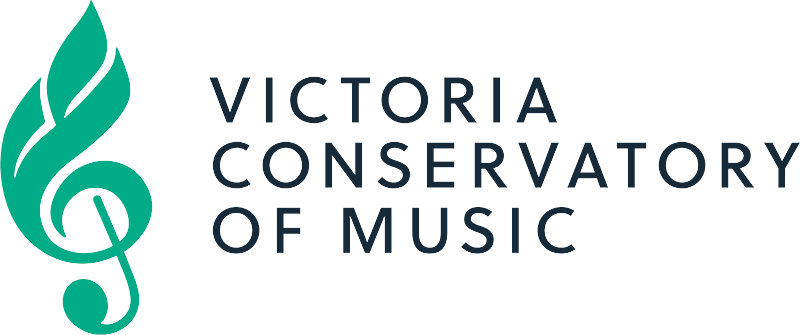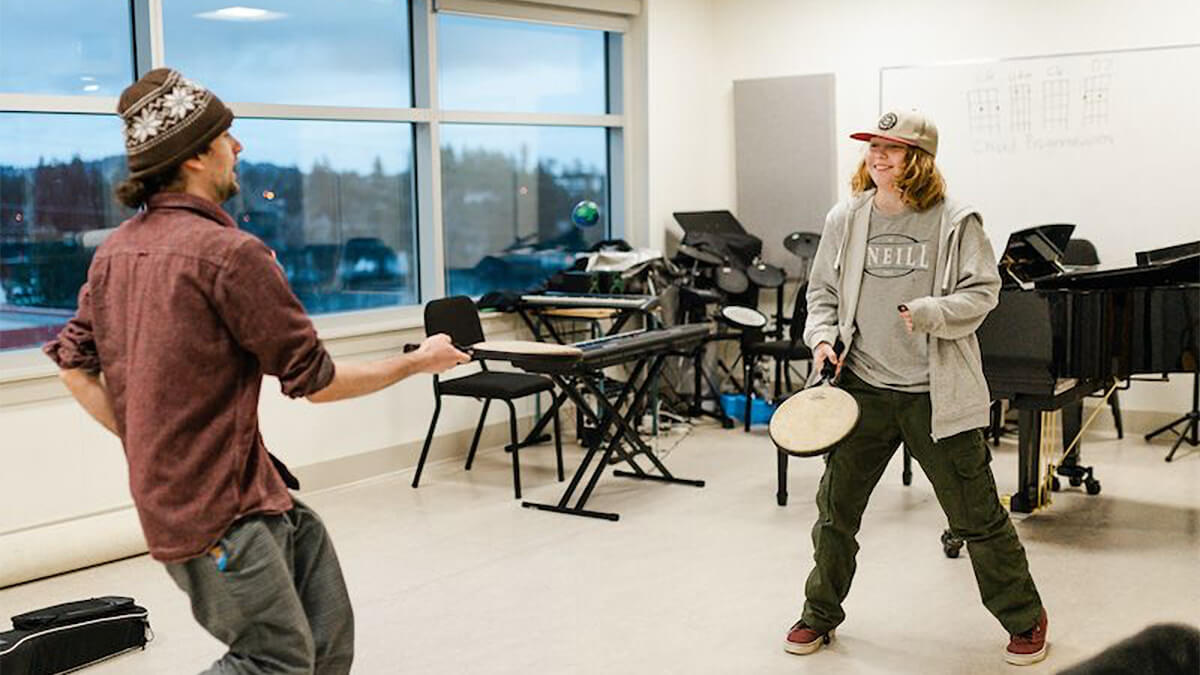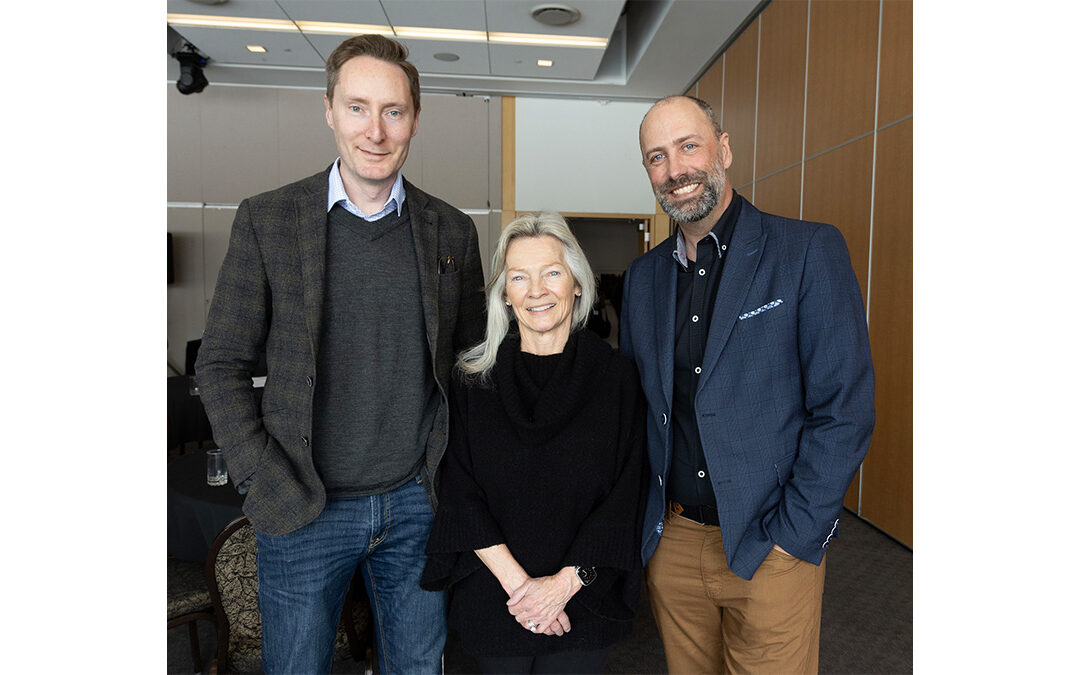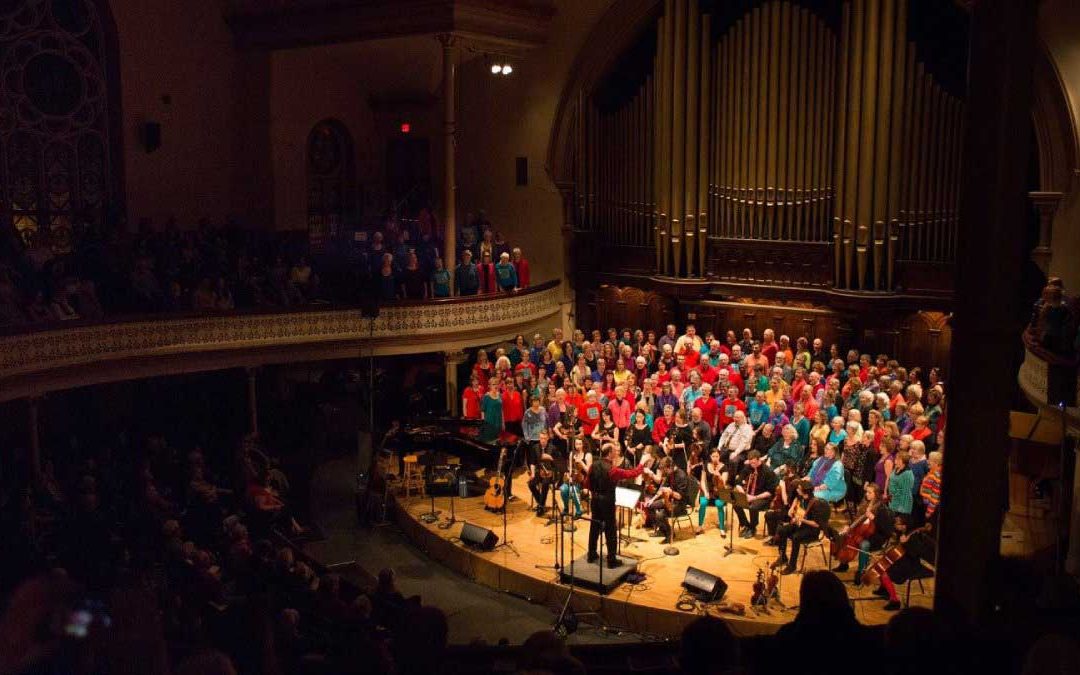The Victoria Conservatory of Music is home to a world-renowned Music Therapy department. The department offers weekly sessions to an average of 1,900 participants. The youngest is under one year old and the oldest, currently, is 107 years old.
The VCM Music Therapy department aims to enhance children’s and youth’s lives, and offers a therapeutic, creative, and nonverbal means of expression.
What is Music Therapy?
Music Therapy is the skillful use of music as a therapeutic tool to restore, maintain, and improve mental, physical, and emotional health. The nonverbal, creative, and affective nature of music facilitates contact, learning, self-expression, communication, and growth.
Music Therapy entails playing instruments, singing, rhythmic movements and dancing, improvising, composing, GIM (guided imagery and music), recording, and active listening. Sessions are offered in private or small groups. Each session is carefully designed for each participant or group.
Music therapists meet the need of children and youth with developmental and/or physical challenges, neurodivergence, brain injury, conduct and/or behavioural disorders, sensory and/or learning difficulties, and support those in palliative care.
Music Therapy improves the quality of life for all.
Creative and Nonverbal Expression
Music Therapy offers a creative and nonverbal means to expression. Each participant can make choices and deal with structure and goals in a creative way.
Music Therapy facilitates contact, learning, self-expression, communication, and growth. Some examples of utilizing a therapeutic, creative, and nonverbal means to expression are:
- Singing improves speech and language skills, articulation, breath control, communication, expression, and reception.
- Playing instruments increases gross and fine motor skills such as dexterity, coordination, balance, range of motion, and strength.
- Music enhances social skills such as active participation, engagement, interaction, self-esteem, and cooperation.
- Rhythmic movements and dancing facilitate mobility, agility, balance, muscular relaxation, spatial relationships, and endurance.
- Improvising offers a creative and nonverbal means to expressing feelings. Through vocal, instrumental and/or movement improvisation, one has the opportunity to make choices and deal with structure in a creative way.
- Composing develops cooperation, learning, sharing ideas and experiences, and increases social skills.
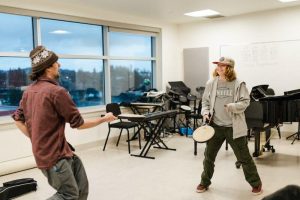
Music Therapy with middle school group
For example, our music therapists are working with a middle school group. The learners are provided a range of opportunities to meet their needs, and Music Therapy is an integral part of their weekly program. It supports these learners in their personal development as well as assisting them to acquire lifelong skills that will transfer to their everyday lives.
The goals for this group are:
- Learning to greet and make choices
- Increasing social skills (taking turn, listening, working as a team, respect to one another)
- Using specific strategic interventions to assist each learner
- Encouraging communication and expression (with technology if needed)
- Growing self-confidence, self-esteem, and identity
- Attending and completing multi-step directions
- Following directions
- Developing specific motor skills
Activities include playing instruments, improvising music (creating music in the moment with various themes and instruments), playing ensemble music (Jazz, Rock, Latin, Country, etc.), participating in movement activities supported by music, and playing musical games specifically chosen and designed to meet the goals set for the learners. If needed, activities use adapted devices and instruments to facilitate full participation in the activities.
The instruments include African drums, paddle drums, handbells, keyboards, drum kit, guitars, ukuleles, chimes, world instruments, and dozens of small melodic and non-melodic instruments.
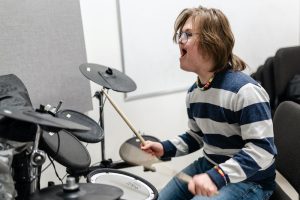
Music Therapy with neurodivergent kids
Another example of how Music Therapy can enhance the lives of youth is with B, a young boy starting a full day of school for the first year. B is neurodivergent and has many gifts but equally great challenges in many areas.
Going to school all day is a big step for B as he must deal with multiple, constant sensory stimulation all around him.
B’s music therapy goals are:
- Making choices
- Learning to play together with the music therapist
- Improvising on various instruments (solo or with music therapist)
- Working through frustration and supporting self-expression
- Learning self-regulating strategies for escalating challenging conduct behaviour (and using the music multi-sensory studio as needed)
- Learning respect
- Developing communication
- Developing tolerance and understanding of sensory stimulation and finding ways for B to strive in his classroom.
Accepting modifications required B to develop an ability to adapt to changes in his own way. At the beginning, the activities were met with resistance and challenging behaviour. However, with encouragement, kindness, patience, full support, strategic interventions, and accentuating the positive, B is now able to de-escalate, self-regulate, and is open to try something new or adapt what was not working the first time.
B’s favourite Music Therapy activities are currently using state of the art technology. He is very curious about the Soundbeam and ORBA2 and absolutely loves creating and recording his stories and compositions adding sound effects, music loops, using the mic and vocal transformer.
Music Therapy has been a weekly time for reconnecting, expression, learning, and simply sharing music time with friends. It creates successful and supportive experiences for B to thrive.
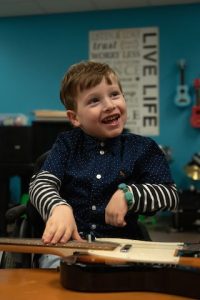
Supporting learning and building life skills
Music therapists play a major role in the life of young participants. They nurture their strengths, support them in their learning journey, maximize their potential, and are present during times of frustration and anxiety.
The non-verbal, creative, and affective nature of music facilitates contact, learning, self-expression, social skills, and communication. It provides learning experiences, reaching life skill goals, and increases wellbeing and community belonging.
Music Therapy is a passion and dedication for the VCM music therapists. It has given a lifeline gift to so many children and youth in our community.
When children and youth are fragile, Music Therapy is used in a way that taps into their abilities and strengths to enhance their sense of self-worth, well-being, learning, adapting, and creating while providing a healthy and successful experience.
Music Therapy sessions
Music Therapy sessions are available at the VCM Downtown Victoria or Westhills locations, online for families living far from our South Island locations, and in person in assisted living, hospitals, and adult/elder care facilities.
Please contact Dr. Johanne Brodeur, Music Therapy Department Head for more information for your loved one.
250-386-5311 ext. 2030
